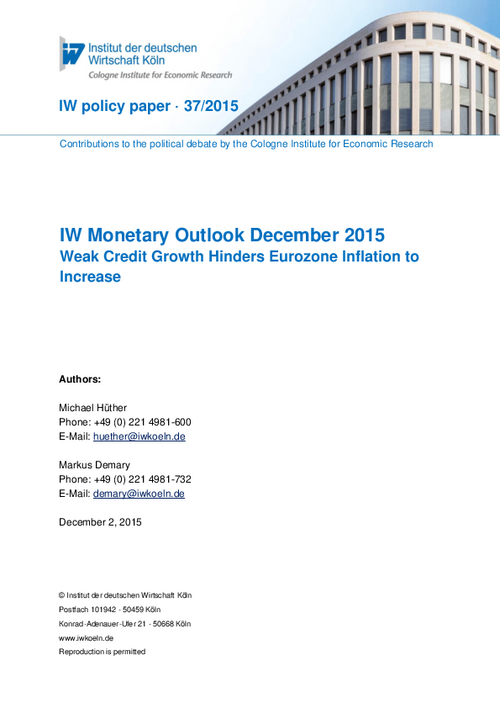Weak Credit Growth Hinders Eurozone Inflation to Increase

IW Monetary Outlook December 2015
IW policy paper

Weak Credit Growth Hinders Eurozone Inflation to Increase
While the ECB still struggles with an impaired bank lending channel of monetary transmission, the Fed successfully fought the labor market slack that was caused by the great recession of 2008. Due to the improved labor market, the Fed can now start its gradual interest rate lift-off. The ECB will increase its stance of policy accommodation instead, since low interest rates still do not translate into higher inflation. On the contrary, inflation and interest rates are decreasing in tandem. The reason for the impaired monetary transmission channel was originally the banking and sovereign debt crisis in the Eurozone, but the impairment of monetary transmission is now caused by banks’ reduction in risk-weighted assets, which are an effect of the implementation of the new Basel III capital ratios. Instead of lending to businesses and households banks increased their exposure to sovereigns. This effect is due to the preferential treatment of sovereign debt in bank regulation and is exacerbated by the low interest rate environment. As long as credit growth does not contribute to the growth of money, reducing interest rates even further will not bring inflation back to its target value.
It seems more and more that banks’ capital regulation hinders the credit channel of monetary transmission to function, on which the ECB has to react by further increasing policy accommodation. It seems doubtful that further policy rate cuts into the negative territory will increase bank lending as long as bank lending is restricted by a lack of equity capital. For inflation to return to normal, banks’ capital regulation has to be adjusted in such a way that the credit channel of monetary transmission is working properly again. For achieving this, the abatement of the preferential treatment of sovereign debt in bank regulation is highly necessary.
Based on our analysis, we expect the ECB to cut its main refinancing rate into negative territory and the deposit rate further into negative territory. Moreover, we expect the ECB to enlarge its asset purchase program for one additional year. For the Fed we expect a gradual adjustment of the Federal Funds Rate corridor by 0.25 percentage points at each of the subsequent open market committee meetings.

Michael Hüther / Markus Demary: IW Monetary Outlook December 2015 – Weak Credit Growth Hinders Eurozone Inflation to Increase
IW policy paper

More on the topic

German Wage Policy between Inflation and Stagnation: Are Conflicts with the Aims of Monetary Policy Looming?
After the economic and financial crisis of 2008/9, the German labour market soon began to recover, creating scope for a comparatively expansive wage policy.
IW
A Macroeconomic Analysis of Wage-Price Spirals
The subject of this Analysis is the forms that wage-price spirals can take and how they influence macroeconomic stability and inflationary trends in Germany.
IW